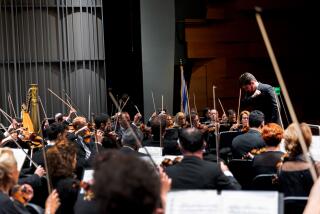Be True to Your Shul
The lead clarinetist of the Machaya Klezmer Band launches a tune so loopy and exuberant that it seems to grab the pedestrian by the lapels and drag him clear across Fairfax Avenue through the open front door of Hatikvah Music International. The proprietor, Simon Rutberg, has been blasting the Machaya CD 10 hours a day, but the melodies have lost none of their power to grab him either. He still bounces slightly to Machayaâs klezmer music--the folk instrumentals spawned in the vanished Jewish shtetls of Eastern Europe. The top three or four buttons of his denim shirt are undone as he tells the history of the record store, one inseparable from that of rock ânâ roll and, more recently, of klezmerâs revival.
Rutberg began working here in the mid-1960s, when Norty Beckman was the owner and the sign read Nortyâs Music Center. On one wall were stacked the dependable Jewish standards; on the other, contemporary pop. âIn a sense, rock ânâ roll was invented in this store,â Rutberg says. âThereâs a couple of fellas that met here. One used to work behind the counter--everyone wanted to get into rock ânâ roll, it was a new thing--and the guy behind the counter wanted to compose.â The duo began noodling on Nortyâs piano, forging the creative relationship that would produce âHound Dog,â âJailhouse Rockâ and other titles made immortal by Elvis Presley. âThose two fellas,â Rutberg confides, âwere Jerry Leiber and Mike Stoller.â Then there was the teenage genius who sometimes roamed Nortyâs store. âThis kidâs father died,â Rutberg recalls, âand on his tombstone was written âto know him is to love him.â â Phil Spector turned his fatherâs epitaph into the first of many hits.
âSo this store has a great history of success,â Rutberg explains over the klezmer wail. âAnd I broke that--I donât want to copy people.â
Rutberg took over the store in 1989 and renamed it Hatikvah, which in Hebrew means âhopeâ and is also the title of Israelâs national anthem. As a young man in East L.A., Rutberg was more familiar with doo-wop than Yiddish singing. But today the preservation of the Yiddish canon is Hatikvahâs chief objective, so thoroughly has Rutberg embraced the music. âYou canât state in English what you can say in Yiddish,â Rutberg now observes. âIt canât be translated. Iâve always said, âYou speak English, but you taste Yiddish.â â
Hatikvahâs expansive klezmer collection includes âYikhes,â a CD of rare prewar recordings ferreted out by a professor of Iranian Studies at UC Berkeley. From a European klezmer renaissance that is not altogether Jewish, he carries both the Austrian group Gojim and the Dutch group Di Gojim. For the jazz aficionado he offers âHora & Blue,â by the Modern Klezmer Quartet, fantastic re-interpretations of Jewish melodies in the styles of John Coltrane and Dave Brubeck.
With klezmer ensembles springing up everywhere from Austria to the Simi Valley, the store may soon be blessed with a mass culture cachet. âItâs all very strange,â Rutberg allows. âIf it becomes hip, then all of a sudden a lot of guys going into rock ânâ roll will say, âWait a minute: It was hip to be Jewish?â â
More to Read
The biggest entertainment stories
Get our big stories about Hollywood, film, television, music, arts, culture and more right in your inbox as soon as they publish.
You may occasionally receive promotional content from the Los Angeles Times.









